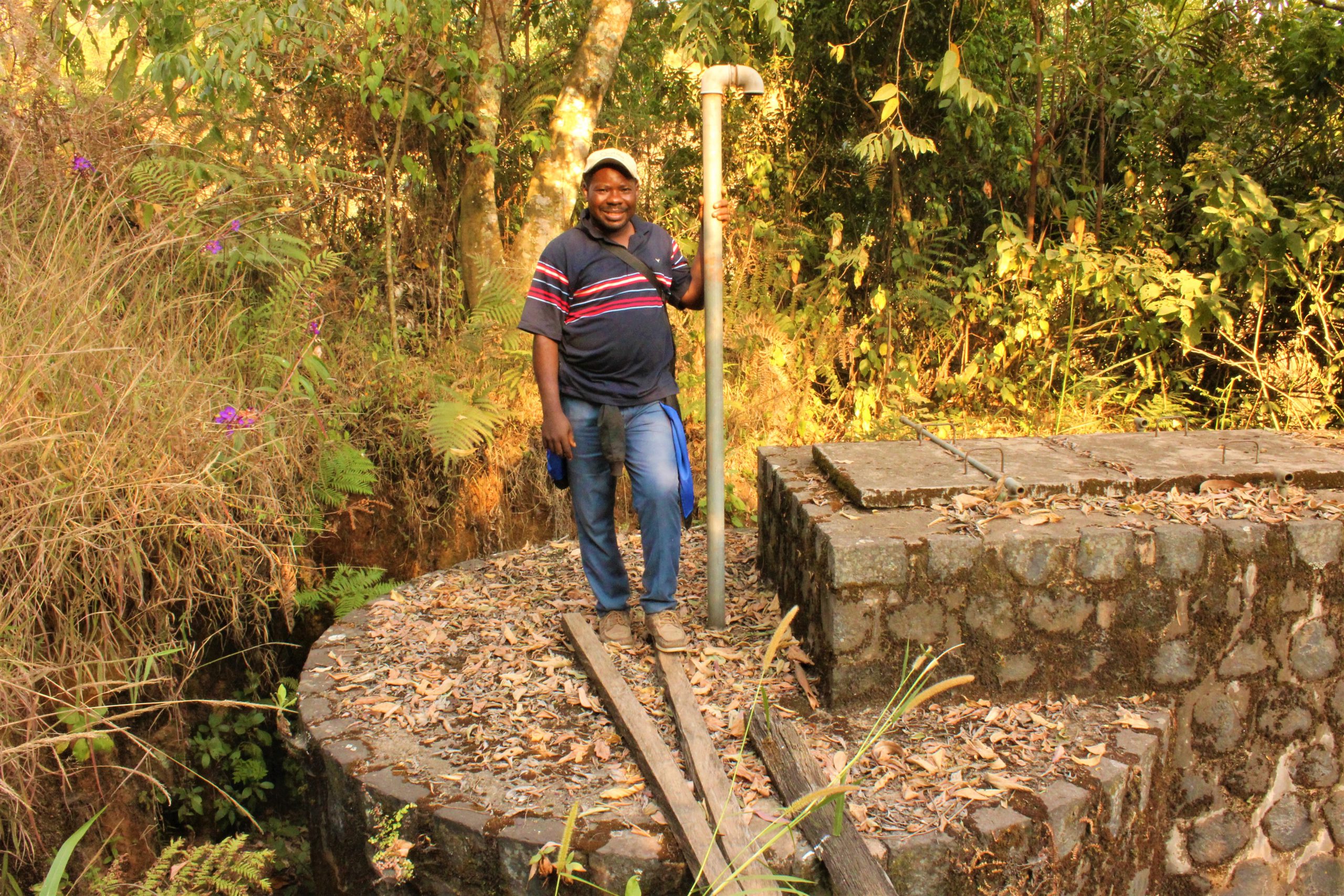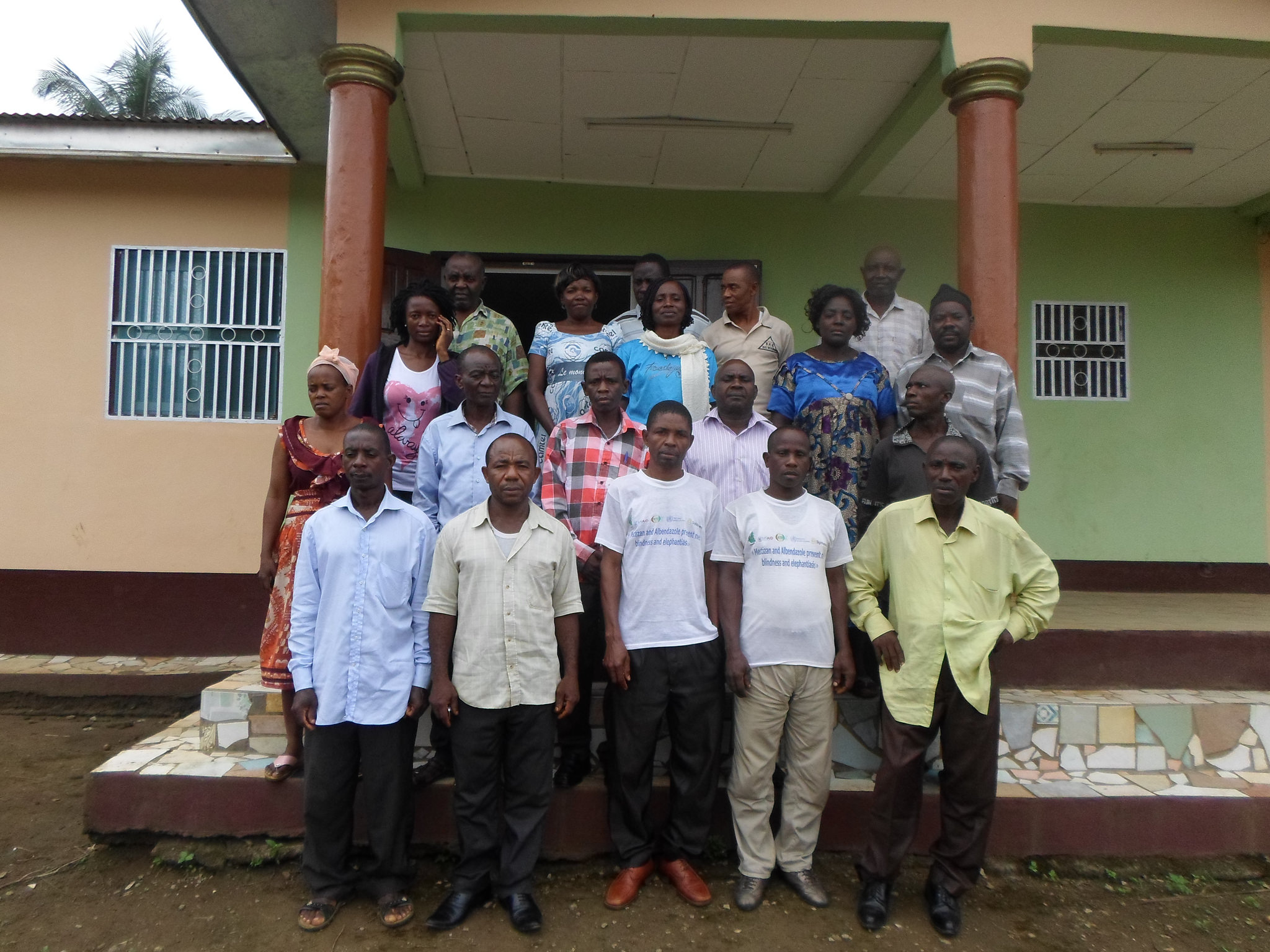
In recent decades, many rural water supply systems in Cameroon have stopped operating and villages are forced to realize their own reliable service delivery of potable water (with or without support of NGOs).
In addition, climate change and fast growing villages lead to an increased need for wood and farm land. Forests are converted to cacao and vegetable farms. even in water catchment areas far- ming is quite common. Quite often villagers (of whom many are women) are forced to farm illegally as they do not have access to land. If not well-planned, agricultural activities cause landslides, erosion and pollution, and subsequently a radical decrease in land and groundwater potential, which contribute to climate change.

Managing a water system and preserving and regenerating forests is complex and requires a solid institutional foundation that enables a sustainable service delivery. Without the provision of necessary long-term support and an entrepreneurial mind set, many projects implemented to provide access to water in these rural communities will continue to fail.

Since 2012 we have therefore developed and implemented our “community-owned, business operated” (COBO) model. It means we support (long term) communities to manage their land and water assets professionally. The maintenance of the water system relies on a locally operated water office. The water office employs professional staff and
generates an income by collecting affordable service fees, which is then used to maintain and renovate the water system in the long run, thus ensuring a sustainable water system. Women play a very important role in this process.

The office is also responsible for preservation of forests and the promotion of resource management. Reforestation of catchment areas take place to sustain a long term water provision. Farmers within the catchment are in mutual agreement replaced and compensated. To support this process farmers are trained to increase the productivity of their land while applying organic farming. Both incentives will be used to promote an initiation of community-led land and water management enabling a large scale bottom-up protection and regeneration of forests.

We have developed our approach in collaboration with a group of local experienced Cameroonian partners. They are the key implementing players in the field. Their skills and expertise varies from project management, to organization building, to training, to technicalities, to sanitation and hygiene.

Our activities to support communities with sustainable land and water management, including the protection and regeneration of forests:
- Build awareness of the relationship between future quantity
and quality of the water provision within the communities and farming practices in the forests.
- Support traditional councils to analyse and revisit land management (rules, procedures and regulations of community land use and ownership).

- Capacitate farmers to increase their production through land improvements that at the same time reduce runoff and increase infiltration.
- Construct drinking water systems and install water of offices to manage these. Work alongside communities to manage and maintain water infrastructure from their own budgets according to our ‘community owned, business operated’ model.
- Build up strong institutions (organizations and capacities) to enable proper management of the natural resources (with emphasis on the water collection area).
- Provide women with alternative opportunities for incomes, they are also working in water companies.


In recent decades, many rural water supply systems in Cameroon have stopped operating and villages are forced to realize their own reliable service delivery of potable water (with or without support of NGOs).
In addition, climate change and fast growing villages lead to an increased need for wood and farm land. Forests are converted to cacao and vegetable farms. even in water catchment areas far- ming is quite common. Quite often villagers (of whom many are women) are forced to farm illegally as they do not have access to land. If not well-planned, agricultural activities cause landslides, erosion and pollution, and subsequently a radical decrease in land and groundwater potential, which contribute to climate change.
Managing a water system and preserving and regenerating forests is complex and requires a solid institutional foundation that enables a sustainable service delivery. Without the provision of necessary long-term support and an entrepreneurial mind set, many projects implemented to provide access to water in these rural communities will continue to fail.


Since 2012 we have therefore developed and implemented our “community-owned, business operated” (COBO) model. It means we support (long term) communities to manage their land and water assets professionally. The maintenance of the water system relies on a locally operated water office. The water office employs professional staff and
generates an income by collecting affordable service fees, which is then used to maintain and renovate the water system in the long run, thus ensuring a sustainable water system. Women play a very important role in this process.
The office is also responsible for preservation of forests and the promotion of resource management. Reforestation of catchment areas take place to sustain a long term water provision. Farmers within the catchment are in mutual agreement replaced and compensated. To support this process farmers are trained to increase the productivity of their land while applying organic farming. Both incentives will be used to promote an initiation of community-led land and water management enabling a large scale bottom-up protection and regeneration of forests.


We have developed our approach in collaboration with a group of local experienced Cameroonian partners. They are the key implementing players in the field. Their skills and expertise varies from project management, to organization building, to training, to technicalities, to sanitation and hygiene.
Our activities to support communities with sustainable land and water management, including the protection and regeneration of forests:
- Build awareness of the relationship between future quantity
and quality of the water provision within the communities and farming practices in the forests.
- Support traditional councils to analyse and revisit land management (rules, procedures and regulations of community land use and ownership).


- Capacitate farmers to increase their production through land improvements that at the same time reduce runoff and increase infiltration.
- Construct drinking water systems and install water of offices to manage these. Work alongside communities to manage and maintain water infrastructure from their own budgets according to our ‘community owned, business operated’ model.
- Build up strong institutions (organizations and capacities) to enable proper management of the natural resources (with emphasis on the water collection area).
- Provide women with alternative opportunities for incomes, they are also working in water companies.

Lucy Gossens, Team Kameroen
lucy@livebuild.org